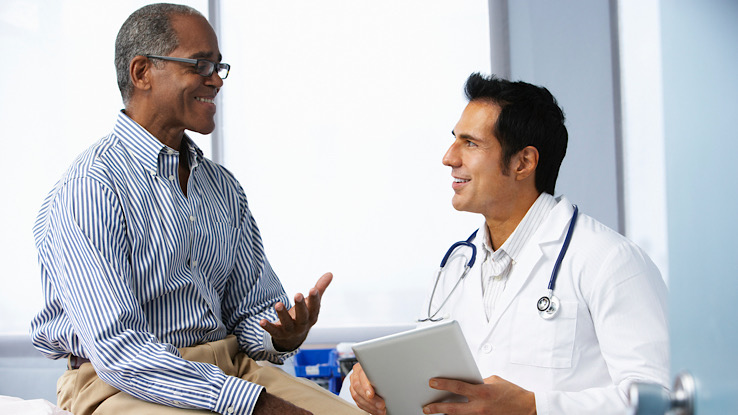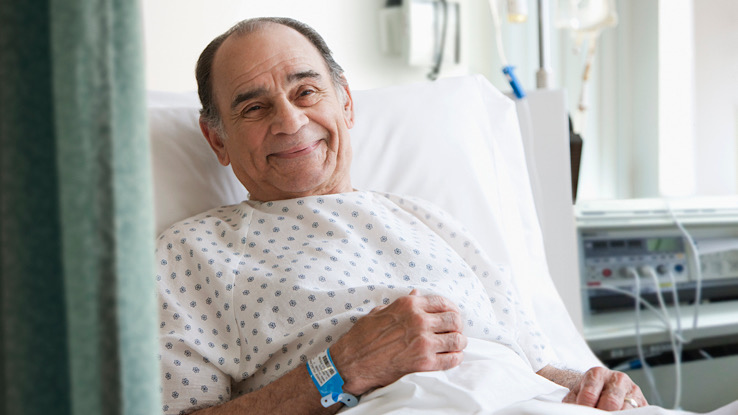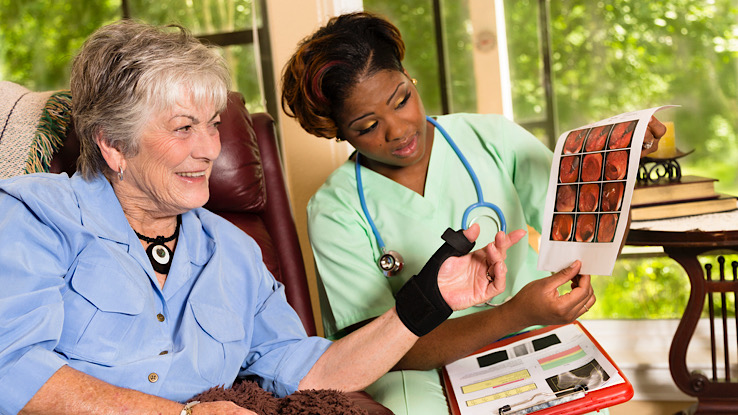Why Would You Eat There Again??

Colorectal cancer (also known as colon cancer) is the third virtually deadly type of cancer in the The states. There are over 50,000 deaths each year. Simply, when it is caught early, there are good handling options bachelor.
Regular screening is how you can take hold of early signs of colon cancer. The U.South. Preventive Services Task Force (USPSTF) recommends that everyone 45 to 75 years onetime be screened for colon cancer. If you're ages 76 to 85, or a high-risk patient, yous should talk to your doctor about your specific screening recommendations. You may be a loftier-risk patient because of your historic period or if yous have a family history of colon cancer.
A colonoscopy is 1 of the most common means to screen for colon cancer. It has been proven to reduce deaths from colon cancer. If your physician sees anything suspicious during your colonoscopy, they tin can have a tissue sample for testing (biopsy) during the same process.
Colonoscopies tin also be used for diagnosis. If you have symptoms of colon cancer — like rectal bleeding, diarrhea, and intestinal pain — talk to your md correct away.
Whether it's for screening or diagnosis, here's what you should know for how to gear up for a colonoscopy.
How Do You Prepare for a Colonoscopy?
During a colonoscopy your doctor needs to be able to see the walls of your intestine. And so you will be asked not to eat solid foods for 24 hours before the procedure. This mode your intestines are totally empty.
In addition to non eating, yous'll need to do something called bowel prep. This will include:
- Using enemas (inserting liquids or gas into the rectum to empty your bowels)
- Taking laxatives
This may cause you to take multiple trips to the bathroom. Your doctor may also ask you to drink plenty of clear liquids, to cease whatsoever blood thinning medicines, and to stop taking any fe pills.
Practice They Put You to Sleep for a Colonoscopy?

Earlier the procedure, generally the doctor gives y'all medication (anesthesia) to relax you and put you to sleep. Under anesthesia, you won't feel whatever pain during the colonoscopy. Subsequently the process is done, you'll ordinarily be awake within a few minutes. Nurses and doctors will monitor you for a little while. If everything is back to your normal state, you can go abode the aforementioned solar day.
Some doctors also offer the option to do non-sedated colonoscopy procedures, where you lot are not asleep. In this case y'all receive pain medications but not anesthesia. If you're interested in this option, talk with your doctor.
What Happens During a Colonoscopy?
Colonoscopies are performed in a procedure room, which is similar to an operating room. When you get in, you'll change into a hospital gown. In the process room, y'all'll be asked to lie on your side with your knees pulled up to your chest.
After you're put to sleep nether anesthesia, a scope that's half an inch wide is inserted through your anus into your big intestines. A camera on the end of the scope sends images to a monitor to be viewed in real time by your medico.
The scope will exist inserted all the way to the first of your large intestines, then on the fashion back out the doctor looks closely for anything that could be cancer. This scope can as well take a biopsy if needed.
Your doctor may besides remove polyps they find. Polyps are extra tissue that grow inside of your torso. Near polyps are not dangerous, but some tin crusade cancer.
How Long Does a Colonoscopy Take?
The colonoscopy procedure usually takes less than an hour. This also depends on what the physician finds during the procedure. You lot'll need to get in to the hospital a couple of hours before your process and stay a couple of hours after your procedure. Most of the time you can go home the same mean solar day every bit your colonoscopy. Only, you should plan to take the whole 24-hour interval off just in instance.
Does a Colonoscopy Hurt?
You volition be nether anesthesia, and then you won't feel anything during the colonoscopy. After the procedure, y'all may feel some temporary discomfort, such equally cramping, bloating, and gas. This is because of the pressure placed on your intestines past the scope, and the gas used to inflate and see your intestines. These symptoms should get away on their own, simply if they don't you should follow up with your doctor.
What Happens Afterward a Colonoscopy?

Later the procedure, your doctor will discuss the side by side steps for y'all. Take someone option you upwards and take you domicile. This is because the anesthesia needs a full twenty-four hour period to completely wear off. You may also have bleeding when you use the bath for the showtime time later on the colonoscopy. If yous have alot of bleeding or strong breadbasket pain, you should call your doc correct away.
If your physician removed a polyp or took a tissue sample during the procedure, you may have special instructions to follow.
What Tin I Eat Afterward a Colonoscopy?
After your colonoscopy, you can slowly return to your regular diet over the next day or and so. Remember that your intestines have but been pushed and stretched by this procedure, then y'all may want to beginning with more than gentle drinks and foods such as:
- Water
- Herbal teas
- Applesauce
- Yogurt
- Cooked vegetables
- Saltines
Attempt not to eat foods that are hard to assimilate right later on the colonoscopy such as:
- Alcoholic beverages
- Raw vegetables
- Nutrient with a lot of spices
- Fried foods
What Are the Risks of Colonoscopy?
Every bit with whatever medical procedure, colonoscopies do have some gamble, although complications are rare. These risks include:
- Bleeding
- Perforation of the intestines (a hole in the lining of your intestines)
- Reaction to the anesthesia
- Abdominal pain
Your doctor will review the risks and benefits of the procedure during your informed consent conversation. Ask whatsoever questions you accept before signing the consent form.
What Are My Options for Colon Cancer Screening?

If you don't want to have a colonoscopy for your regular colon cancer screening, yous take other options.
The USPSTF has recommended 3 stool-based tests, which are gFOBT, FIT, and sDNA-FIT. For these three tests, y'all get a kit at dwelling that you put a stool sample into. Then you ship information technology in by postal service for analysis. These tests need to be done every 1 to 3 years, whereas a colonoscopy needs to be done every 10 years.
In that location are also other procedure-based screening tests such as:
- CT browse colonography: This uses low dose radiation to get images of your bowels. This procedure requires screening every 5 years.
- Flexible sigmoidoscopy: This is like to a colonoscopy, simply the doctor just examines your rectum and lower colon. The colonoscopy looks at the unabridged large intestines. This procedure procedure requires screening every 5 years, or every 10 years if combined with the annual FIT stool-based test.
Talk to your medico most which colon cancer screening pick is right for you.
Resource Links:
- "Colonoscopy" via MedlinePlus
- "Colorectal Cancer Guidelines" via American Cancer Society
- "Effectiveness of screening colonoscopy in reducing the risk of death from correct and left colon cancer: a large customs-based written report" via Gut
- "Colorectal Cancer sScreening" via Chief Care
- "Become Tested for Colorectal Cancer" via MyHealthfinder
- "The patient'due south perspective – patients should exist made aware of the options of sedation or no sedation and have a option in screening colonoscopy" via Journal of Interventional Gastroenterology
- "Screening for Colorectal Cancer: US Preventive Services Chore Force Recommendation Statement" via JAMA
Source: https://www.symptomfind.com/healthy-living/what-you-need-to-know-before-a-colonoscopy?utm_content=params%3Ao%3D740013%26ad%3DdirN%26qo%3DserpIndex
0 Response to "Why Would You Eat There Again??"
Postar um comentário